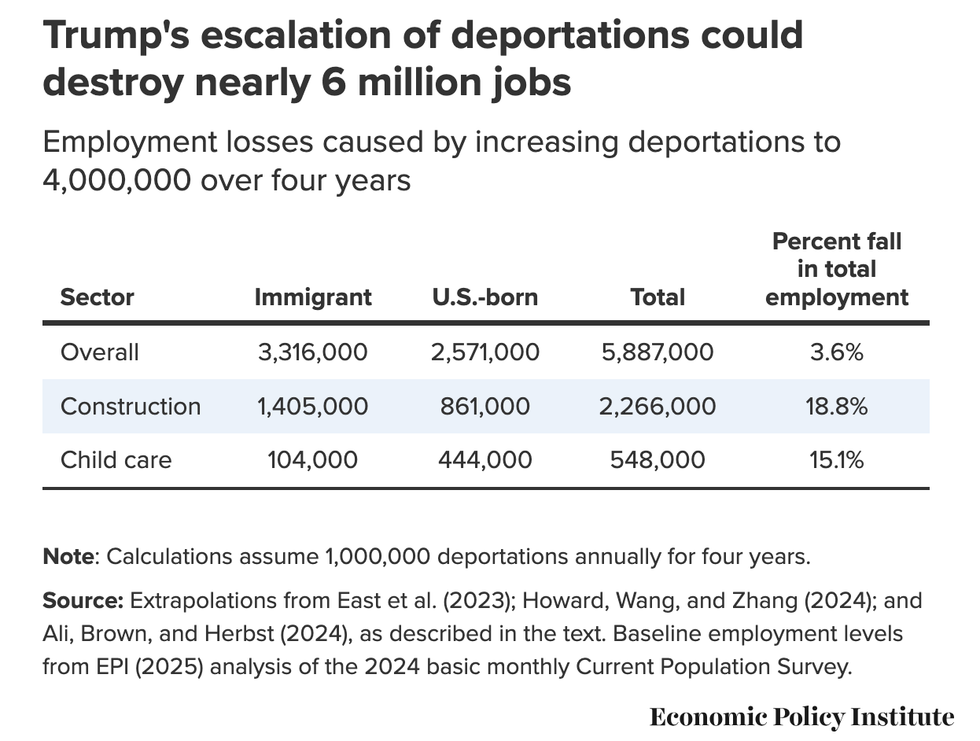
Federal agents detain an immigrant at a court hearing in New York City on July 1, 2025.
Trump Mass Deportations Will Cause 'Immense Pain' for Workers and Destroy Millions of Jobs: Report
"The Trump administration's deportation goals will cause a major blow to the U.S. labor market," according to a new analysis by the Economic Policy Institute.
If President Donald Trump succeeds at deporting millions of people over the next four years, his administration will be responsible for destroying millions of jobs and inflicting "immense pain" on both U.S.-born and immigrant workers.
That's according to a report published Thursday by the Economic Policy Institute (EPI), which bases its analysis on the Trump administration's privately stated goal of deporting at least 1 million immigrants during the Republican president's first year back in the White House.
Should the administration achieve that deportation objective each year for the remainder of Trump's term, "there will be 3.3 million fewer employed immigrants and 2.6 million fewer employed U.S.-born workers at the end of that period," wrote EPI senior economist Ben Zipperer.
"Employment in the construction sector will drop sharply: U.S.-born construction employment will fall by 861,000, and immigrant employment will fall by 1.4 million," Zipperer wrote. In late May, Immigration and Customs Enforcement (ICE) publicly touted its arrest of more than 100 construction workers in Tallahassee, Florida.
The millions of deportations desired by Trump and his deputies would also "eliminate half a million childcare jobs," EPI estimated.
Every state in the U.S. would be impacted by the president's attack on immigrants, according to Zipperer's analysis, but California, Florida, New York, and Texas would be most heavily impacted.
"The Trump administration's deportation goals will cause a major blow to the U.S. labor market," Zipperer wrote, "squandering the full employment that the Trump administration inherited from the Biden administration and also causing immense pain to the millions of U.S.-born and immigrant workers who may lose their jobs."

The EPI analysis comes days after Trump signed into law a sprawling budget measure that includes $75 billion in additional funding over the next four years for ICE, an agency whose current annual budget is around $10 billion. The $75 billion figure includes nearly $30 million for enforcement and deportation.
Immigrant rights groups and analysts warned following the Republican legislation's passage that the massive boost in ICE funding would supercharge Trump's mass deportation machine.
"There is a question of how quickly ICE can build up its infrastructure and personnel using its newfound resources," Vox's Nicole Narea wrote Thursday. "But just days after the bill passed, the administration made a show of force at Los Angeles' MacArthur Park on Monday, with heavily armed immigration agents in tactical gear and military-style trucks showing up to arrest undocumented immigrants."
Trump's mass deportation efforts are already having an impact on the U.S. economy, according to top officials and recent employment data.
During congressional testimony last month, Federal Reserve Chair Jerome Powell—against whom Trump frequently rails despite initially picking him for the job during his first White House term—said the president's draconian crackdown on immigration was "one of the reasons" for slowing U.S. economic growth.
Earlier this month, following the release of the June jobs report, labor economist Mark Regets told Forbes that "the data for the last five months indicate a serious fall in the number of immigrant workers."
"Despite growth in the unadjusted numbers, the U.S.-born labor force participation rate and the overall seasonally adjusted labor force total suggest that the loss of immigrant labor is not bringing more U.S.-born workers into the labor force," said Regets.
In a tacit admission that its mass deportation agenda is damaging employment in certain industries, the Trump administration reportedly instructed ICE officials last month to mostly pause raids on agricultural, hotel, and restaurant work sites.
An Urgent Message From Our Co-Founder
Dear Common Dreams reader, The U.S. is on a fast track to authoritarianism like nothing I've ever seen. Meanwhile, corporate news outlets are utterly capitulating to Trump, twisting their coverage to avoid drawing his ire while lining up to stuff cash in his pockets. That's why I believe that Common Dreams is doing the best and most consequential reporting that we've ever done. Our small but mighty team is a progressive reporting powerhouse, covering the news every day that the corporate media never will. Our mission has always been simple: To inform. To inspire. And to ignite change for the common good. Now here's the key piece that I want all our readers to understand: None of this would be possible without your financial support. That's not just some fundraising cliche. It's the absolute and literal truth. We don't accept corporate advertising and never will. We don't have a paywall because we don't think people should be blocked from critical news based on their ability to pay. Everything we do is funded by the donations of readers like you. Will you donate now to help power the nonprofit, independent reporting of Common Dreams? Thank you for being a vital member of our community. Together, we can keep independent journalism alive when it’s needed most. - Craig Brown, Co-founder |
If President Donald Trump succeeds at deporting millions of people over the next four years, his administration will be responsible for destroying millions of jobs and inflicting "immense pain" on both U.S.-born and immigrant workers.
That's according to a report published Thursday by the Economic Policy Institute (EPI), which bases its analysis on the Trump administration's privately stated goal of deporting at least 1 million immigrants during the Republican president's first year back in the White House.
Should the administration achieve that deportation objective each year for the remainder of Trump's term, "there will be 3.3 million fewer employed immigrants and 2.6 million fewer employed U.S.-born workers at the end of that period," wrote EPI senior economist Ben Zipperer.
"Employment in the construction sector will drop sharply: U.S.-born construction employment will fall by 861,000, and immigrant employment will fall by 1.4 million," Zipperer wrote. In late May, Immigration and Customs Enforcement (ICE) publicly touted its arrest of more than 100 construction workers in Tallahassee, Florida.
The millions of deportations desired by Trump and his deputies would also "eliminate half a million childcare jobs," EPI estimated.
Every state in the U.S. would be impacted by the president's attack on immigrants, according to Zipperer's analysis, but California, Florida, New York, and Texas would be most heavily impacted.
"The Trump administration's deportation goals will cause a major blow to the U.S. labor market," Zipperer wrote, "squandering the full employment that the Trump administration inherited from the Biden administration and also causing immense pain to the millions of U.S.-born and immigrant workers who may lose their jobs."

The EPI analysis comes days after Trump signed into law a sprawling budget measure that includes $75 billion in additional funding over the next four years for ICE, an agency whose current annual budget is around $10 billion. The $75 billion figure includes nearly $30 million for enforcement and deportation.
Immigrant rights groups and analysts warned following the Republican legislation's passage that the massive boost in ICE funding would supercharge Trump's mass deportation machine.
"There is a question of how quickly ICE can build up its infrastructure and personnel using its newfound resources," Vox's Nicole Narea wrote Thursday. "But just days after the bill passed, the administration made a show of force at Los Angeles' MacArthur Park on Monday, with heavily armed immigration agents in tactical gear and military-style trucks showing up to arrest undocumented immigrants."
Trump's mass deportation efforts are already having an impact on the U.S. economy, according to top officials and recent employment data.
During congressional testimony last month, Federal Reserve Chair Jerome Powell—against whom Trump frequently rails despite initially picking him for the job during his first White House term—said the president's draconian crackdown on immigration was "one of the reasons" for slowing U.S. economic growth.
Earlier this month, following the release of the June jobs report, labor economist Mark Regets told Forbes that "the data for the last five months indicate a serious fall in the number of immigrant workers."
"Despite growth in the unadjusted numbers, the U.S.-born labor force participation rate and the overall seasonally adjusted labor force total suggest that the loss of immigrant labor is not bringing more U.S.-born workers into the labor force," said Regets.
In a tacit admission that its mass deportation agenda is damaging employment in certain industries, the Trump administration reportedly instructed ICE officials last month to mostly pause raids on agricultural, hotel, and restaurant work sites.
- Opinion | Trump’s Brand of Law Enforcement: Deportation Yes, Worker Protection No | Common Dreams ›
- 'Very Significant Sign of Weakening': Bad Jobs Report Sets Off Alarms About US Economy Under Trump | Common Dreams ›
- Opinion | Immigrant or US-Born, We’re All in the Same Boat | Common Dreams ›
- Trump Deportation Push Continues With TSA-ICE Partnership and Move to Strip Legal Status | Common Dreams ›
- Opinion | An Injury to Immigrant Workers Is an Injury to All Workers | Common Dreams ›
If President Donald Trump succeeds at deporting millions of people over the next four years, his administration will be responsible for destroying millions of jobs and inflicting "immense pain" on both U.S.-born and immigrant workers.
That's according to a report published Thursday by the Economic Policy Institute (EPI), which bases its analysis on the Trump administration's privately stated goal of deporting at least 1 million immigrants during the Republican president's first year back in the White House.
Should the administration achieve that deportation objective each year for the remainder of Trump's term, "there will be 3.3 million fewer employed immigrants and 2.6 million fewer employed U.S.-born workers at the end of that period," wrote EPI senior economist Ben Zipperer.
"Employment in the construction sector will drop sharply: U.S.-born construction employment will fall by 861,000, and immigrant employment will fall by 1.4 million," Zipperer wrote. In late May, Immigration and Customs Enforcement (ICE) publicly touted its arrest of more than 100 construction workers in Tallahassee, Florida.
The millions of deportations desired by Trump and his deputies would also "eliminate half a million childcare jobs," EPI estimated.
Every state in the U.S. would be impacted by the president's attack on immigrants, according to Zipperer's analysis, but California, Florida, New York, and Texas would be most heavily impacted.
"The Trump administration's deportation goals will cause a major blow to the U.S. labor market," Zipperer wrote, "squandering the full employment that the Trump administration inherited from the Biden administration and also causing immense pain to the millions of U.S.-born and immigrant workers who may lose their jobs."

The EPI analysis comes days after Trump signed into law a sprawling budget measure that includes $75 billion in additional funding over the next four years for ICE, an agency whose current annual budget is around $10 billion. The $75 billion figure includes nearly $30 million for enforcement and deportation.
Immigrant rights groups and analysts warned following the Republican legislation's passage that the massive boost in ICE funding would supercharge Trump's mass deportation machine.
"There is a question of how quickly ICE can build up its infrastructure and personnel using its newfound resources," Vox's Nicole Narea wrote Thursday. "But just days after the bill passed, the administration made a show of force at Los Angeles' MacArthur Park on Monday, with heavily armed immigration agents in tactical gear and military-style trucks showing up to arrest undocumented immigrants."
Trump's mass deportation efforts are already having an impact on the U.S. economy, according to top officials and recent employment data.
During congressional testimony last month, Federal Reserve Chair Jerome Powell—against whom Trump frequently rails despite initially picking him for the job during his first White House term—said the president's draconian crackdown on immigration was "one of the reasons" for slowing U.S. economic growth.
Earlier this month, following the release of the June jobs report, labor economist Mark Regets told Forbes that "the data for the last five months indicate a serious fall in the number of immigrant workers."
"Despite growth in the unadjusted numbers, the U.S.-born labor force participation rate and the overall seasonally adjusted labor force total suggest that the loss of immigrant labor is not bringing more U.S.-born workers into the labor force," said Regets.
In a tacit admission that its mass deportation agenda is damaging employment in certain industries, the Trump administration reportedly instructed ICE officials last month to mostly pause raids on agricultural, hotel, and restaurant work sites.
- Opinion | Trump’s Brand of Law Enforcement: Deportation Yes, Worker Protection No | Common Dreams ›
- 'Very Significant Sign of Weakening': Bad Jobs Report Sets Off Alarms About US Economy Under Trump | Common Dreams ›
- Opinion | Immigrant or US-Born, We’re All in the Same Boat | Common Dreams ›
- Trump Deportation Push Continues With TSA-ICE Partnership and Move to Strip Legal Status | Common Dreams ›
- Opinion | An Injury to Immigrant Workers Is an Injury to All Workers | Common Dreams ›

